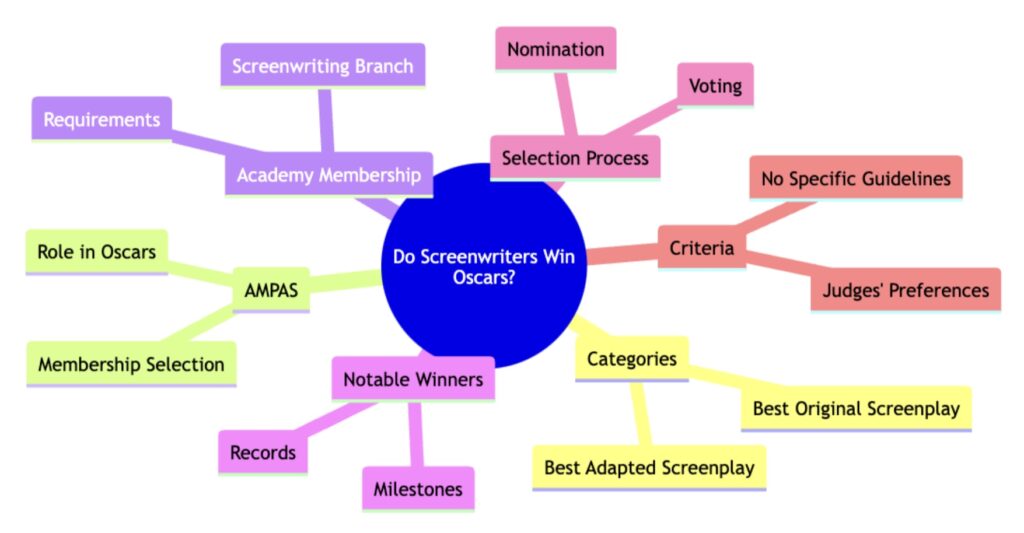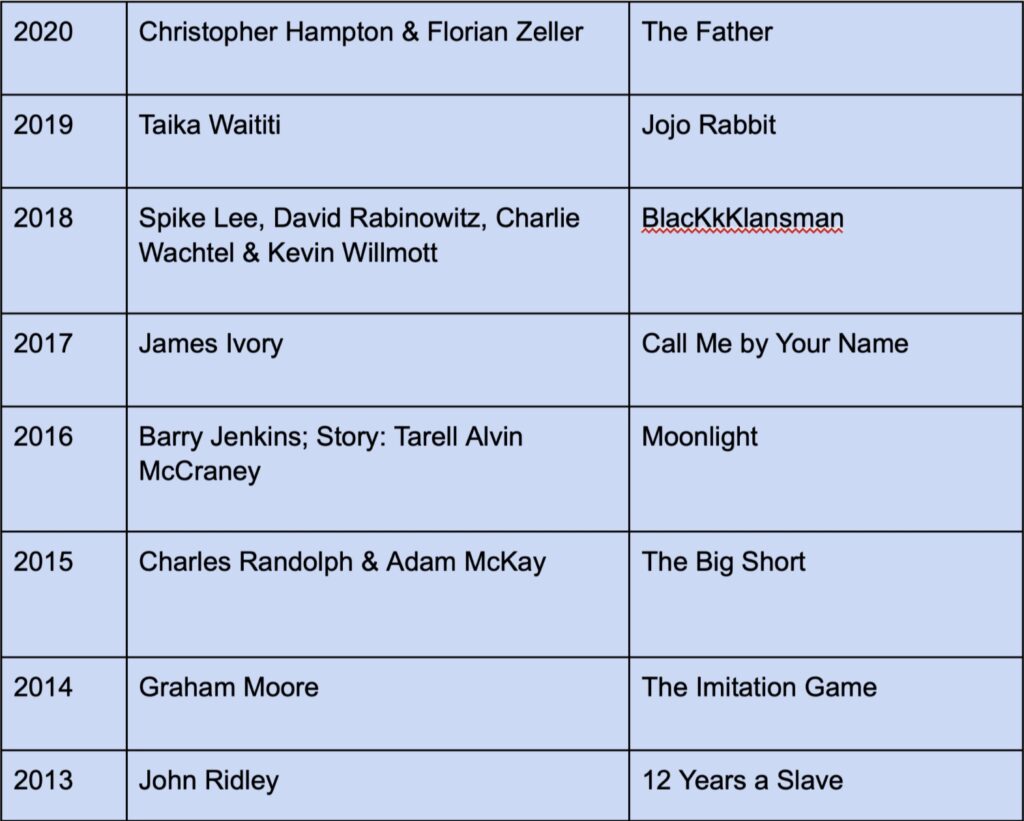The Oscars are considered the peak of cinematic achievement. The Best Screenplay categories—Best Original Screenplay and Best Adapted Screenplay—stand as a testament to the storytelling prowess that screenwriters bring to the table.
Whether crafting an original narrative that transports audiences to new worlds or adapting a familiar story to offer a fresh cinematic perspective, screenwriters serve as the unsung heroes of the movies we love.
This article delves into the intricacies of these prestigious awards, from their history and notable winners to the rigorous selection process. It aims to be the definitive guide on the subject.
Key Takeaways
- Screenwriters can win Oscars in two categories: Best Original Screenplay and Best Adapted Screenplay.
- The Academy of Motion Picture Arts and Sciences (AMPAS) is responsible for the selection process.
- Notable screenwriters have made history by winning in these categories.
- The selection process involves a rigorous voting mechanism.
- There are no set criteria for what makes a screenplay “best,” leaving it up to the judges’ discretion.

The History of the Best Screenplay Oscar
The Oscars have been recognizing screenwriting talent since the early days of cinema. The first Oscars ceremony took place in 1929, and since then, the categories have evolved to include Best Original Screenplay and Best Adapted Screenplay.
Milestones
- First Winners: The first Oscar for screenwriting was awarded in 1929.
- Category Evolution: Initially, there was only one writing category, which later split into two: Original and Adapted.
- Historical Wins: Movies like “Gone with the Wind” and “Casablanca” have won in the Adapted category, while “Pulp Fiction” and “Get Out” have won in the Original category.
The Academy and Its Role
The Oscars are organized by the Academy of Motion Picture Arts and Sciences (AMPAS), a professional honorary organization. AMPAS is responsible for setting the rules and procedures for the Oscars, including the categories and the voting process.
AMPAS Membership
- Total Members: Over 9,000 members across various branches, including the screenwriting chapter.
- Voting Rights: Only members of the screenwriting branch can vote for the Best Screenplay nominees.
How to Become a Member of the Academy’s Screenwriting Branch
Becoming a member of AMPAS is a significant milestone in any screenwriter’s career. Membership is by invitation only, and candidates must meet specific criteria to be considered.
Requirements for Membership
- Industry Experience: A minimum of two screenwriting credits in theatrically released films.
- Sponsorship: Two current Academy members must sponsor the candidate.
The Process
- Application: Submit an application with all required documents.
- Review: The screenwriting branch reviews the application.
- Invitation: If approved, an invitation to join the Academy is extended.
The Categories Explained
Regarding screenwriting, the Oscars have two primary categories: Best Original Screenplay and Best Adapted Screenplay. The distinction between these two is crucial for both the screenwriters and the audience.
Best Original Screenplay
This category is for screenplays written from scratch, not adapted from another source. These stories originate from the screenwriter’s mind, offering fresh narratives and unique perspectives. Films like “Eternal Sunshine of the Spotless Mind” and “Juno” have been lauded for their originality in this category.
Best Adapted Screenplay
On the other hand, Best Adapted Screenplay honors works that have been adapted from another medium, such as books, plays, or even earlier films. These adaptations require a different set of skills, as the screenwriter must honor the original work while making it suitable for the cinematic medium. Classics like “To Kill a Mockingbird” and modern hits like “The Social Network” have earned Oscars in this category.
Table: Differences Between Original and Adapted Screenplay

Notable Winners and Milestones
The Oscars have a rich history of recognizing exceptional talent in screenwriting. Over the years, some screenwriters have left an indelible mark on this prestigious award ceremony.
First and Only African American Winner
Jordan Peele made history by becoming the first and only African American writer to win Best Original Screenplay for his groundbreaking film “Get Out.” This win was not just a personal achievement for Peele but a milestone for diversity in Hollywood.
Youngest and Oldest Winners
Ben Affleck was just 25 when he won for “Good Will Hunting,” making him one of the youngest winners. On the flip side, Ronald Harwood was 68 when he won for “The Pianist,” proving that age is just a number when it comes to talent.
Table 2: Screenwriters Awarded Oscar for Best Original Screenplay In The Last 10 Years



Table 3: Screenwriters Awarded Oscar for Best Adapted Screenplay In The Last 10 Years:


The Selection Process
The Oscars’ selection process is a rigorous and highly confidential affair. It involves multiple rounds of voting carried out by the members of the Academy’s screenwriting branch.
Nomination Process
The first step is the nomination process, where screenplays from the previous year are shortlisted. Members of the screenwriting branch are given a list of eligible screenplays, and they vote for their top choices. The five screenplays with the most votes become the official nominees.
Voting Mechanism
Once the nominees are finalized, the entire Academy votes. Each member ranks the nominees, and the screenplay with the most votes wins the coveted Oscar.
What Are the Judges Looking For?
The criteria for what makes a screenplay “best” are not set in stone. Unlike the technical categories, where specific metrics can be measured, the Best Screenplay categories are more subjective.
Judges often seek compelling storytelling, well-rounded characters, and dialogue that resonates with audiences.
Factors That Influence Judges
- Narrative Structure: A well-structured story that keeps the audience engaged.
- Character Development: Characters must evolve and have depth.
- Dialogue: Authentic and impactful dialogue that drives the story.
- Originality or Adaptation Skill: The freshness of the concept is vital for original screenplays. In contrast, the success of adapted screenplays depends on how well the original material is translated to the screen.
- Cultural Impact: Stories that resonate on a broader cultural level often get extra attention.
Top 5 Most Awarded Screenwriters in Oscar History
- Woody Allen: 3 wins, 16 nominations
- Charles Brackett: 4 wins, 6 nominations
- Billy Wilder: 2 wins, 12 nominations
- Paddy Chayefsky: 3 wins, 3 nominations
- Quinten Tarintino: 2 wins, 4 nominations
Conclusion
The Best Screenplay categories at the Oscars testify to the power of storytelling in cinema. Whether it’s an original concept that takes us to new worlds or an adapted story that gives a fresh perspective on familiar tales, screenwriters are the unsung heroes of the movies we love. Their ability to craft compelling narratives, create unforgettable characters, and touch upon universal themes is what makes cinema a transformative experience.
Additional Resources
For those looking to delve deeper into the world of screenwriting and the Oscars, here are some additional resources:
Books, Documentaries, and Websites
- Books: “Adventures in the Screen Trade” by William Goldman, “Story” by Robert McKee
- Documentaries: “The Cutting Edge: The Magic of Movie Editing,” “Tales from the Script”
- Websites: The Black List, Simply Scripts, The Academy’s official website

